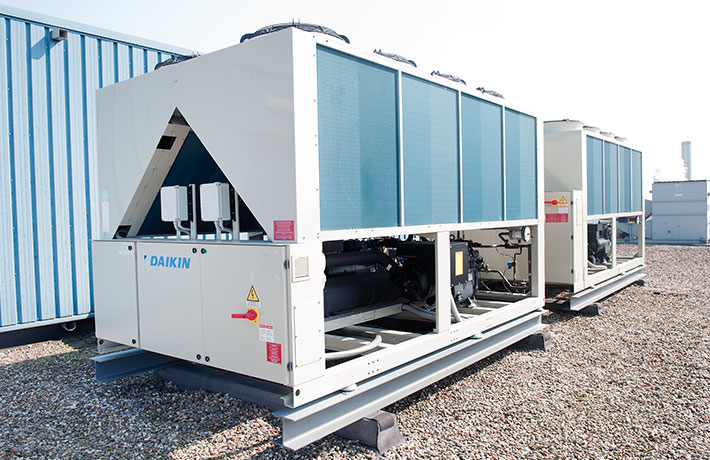

Chillers
Chillers are devices or systems designed to cool and dehumidify air or other fluids for various industrial and commercial purposes. They are commonly used in HVAC (heating, ventilation, and air conditioning) systems to maintain a comfortable temperature in buildings, as well as in industrial processes where temperature control is critical.
Here are some key points about chillers:
Basic Functionality:
- Chillers work on the principle of removing heat from a space or substance, usually through the process of vapor compression or absorption refrigeration.
- The main components of a chiller typically include a compressor, evaporator, condenser, and an expansion valve.
Types of Chillers:
- Vapor Compression Chillers: These are the most common type of chillers and operate by compressing and condensing a refrigerant gas to absorb and remove heat.
- Absorption Chillers: These use a heat source (typically steam or hot water) to drive the absorption of a refrigerant, resulting in cooling.
Applications:
- Chillers are used in a wide range of applications, including air conditioning for commercial and industrial buildings, process cooling in industries like manufacturing and chemical processing, and data center cooling.
Efficiency and Environmental Considerations:
- The efficiency of a chiller is an important factor, and modern chillers often incorporate energy-saving features and technologies to improve their performance.
- Environmental considerations have led to the development of chillers that use refrigerants with lower global warming potential (GWP) and ozone depletion potential (ODP).
Maintenance and Operation:
- Regular maintenance is crucial to ensure the optimal performance of a chiller. This may include cleaning coils, checking refrigerant levels, and inspecting other components.
- Proper operation and control are essential to achieve energy efficiency and maintain a consistent temperature.
Size and Capacity:
- Chillers come in various sizes and capacities to accommodate different cooling needs. The size of the chiller depends on factors such as the size of the space to be cooled and the heat load.
Chillers play a vital role in maintaining comfortable and controlled environments in various settings, contributing to the efficiency and functionality of different processes and systems.
For More Information , contact Ritu’s refrigeration
